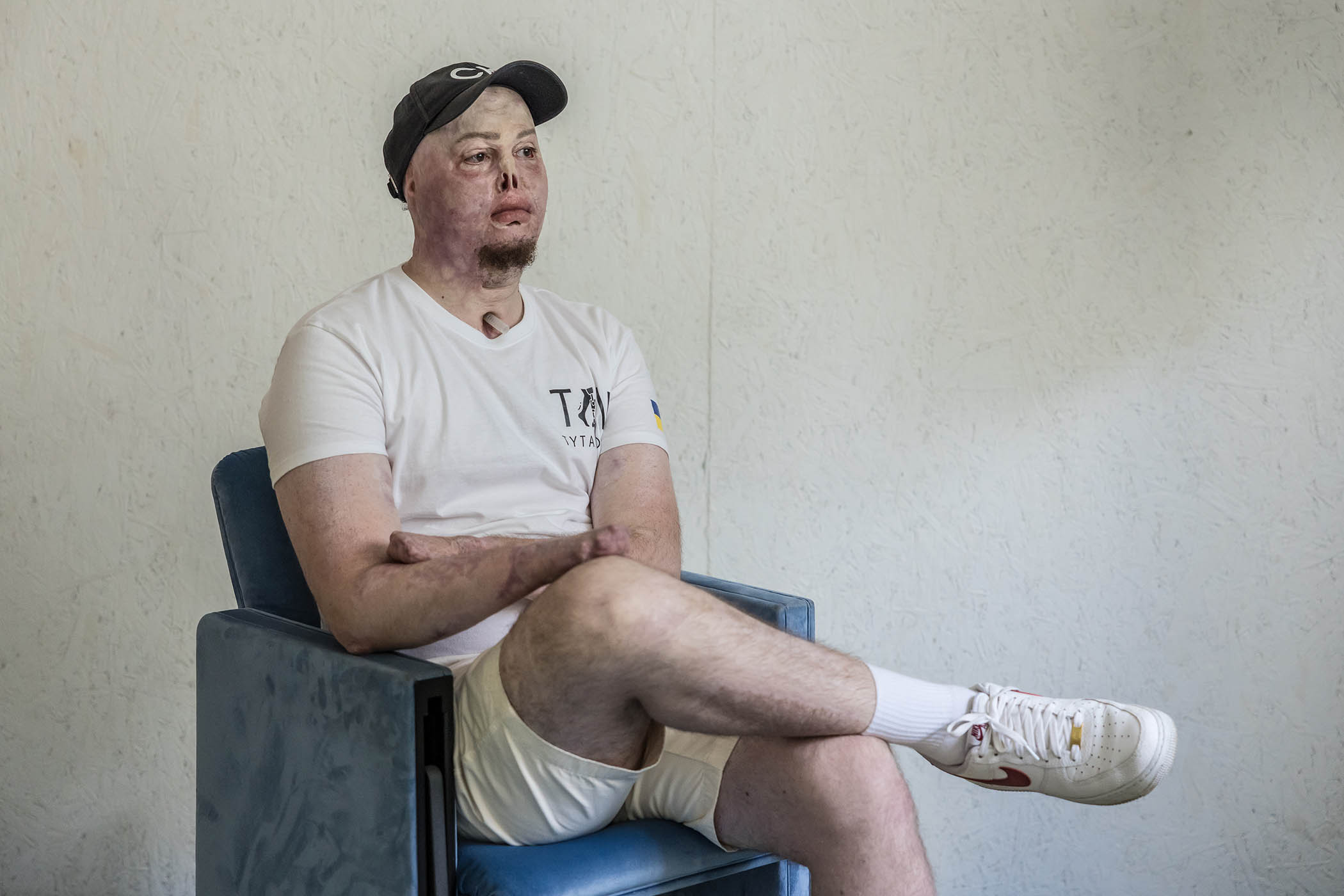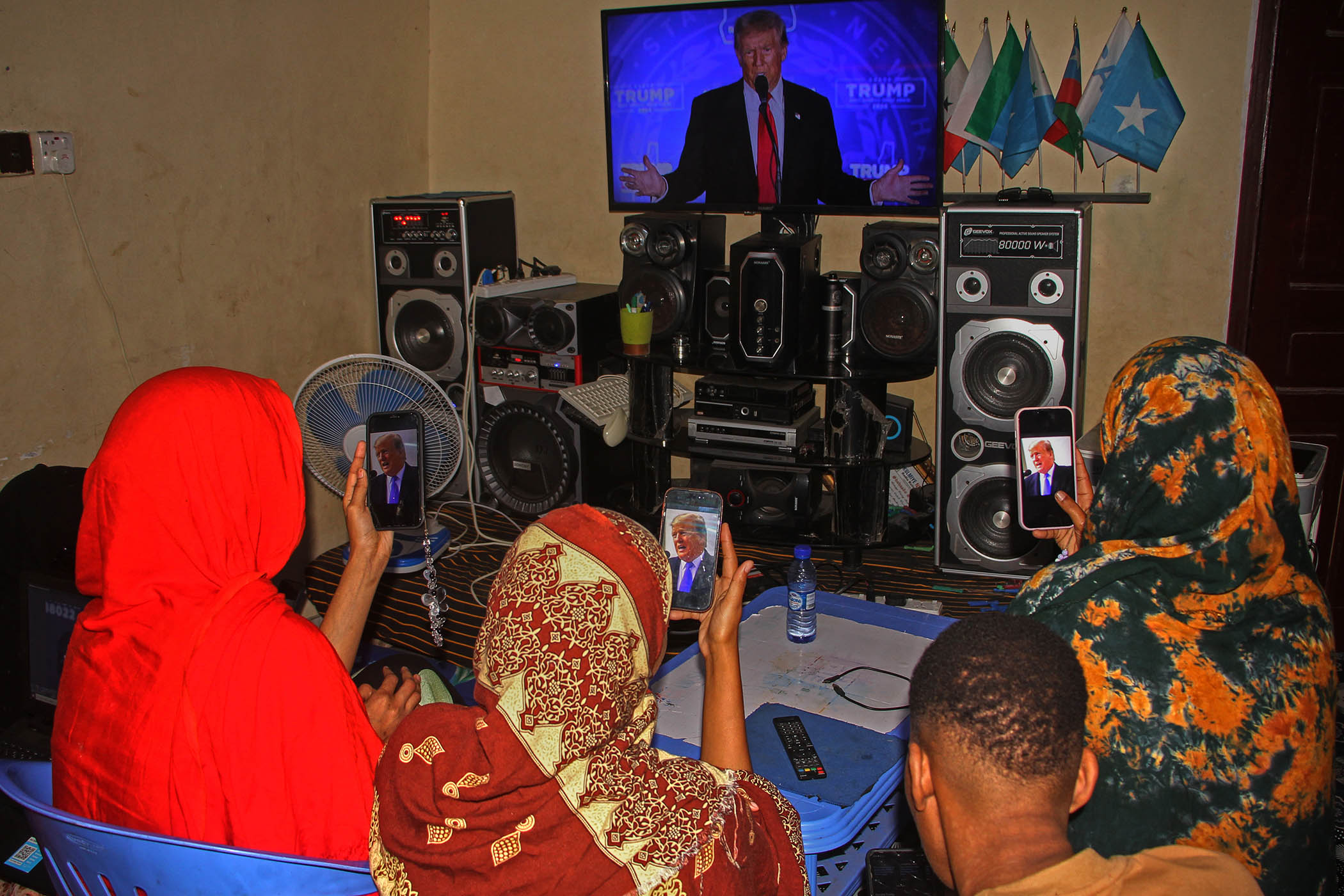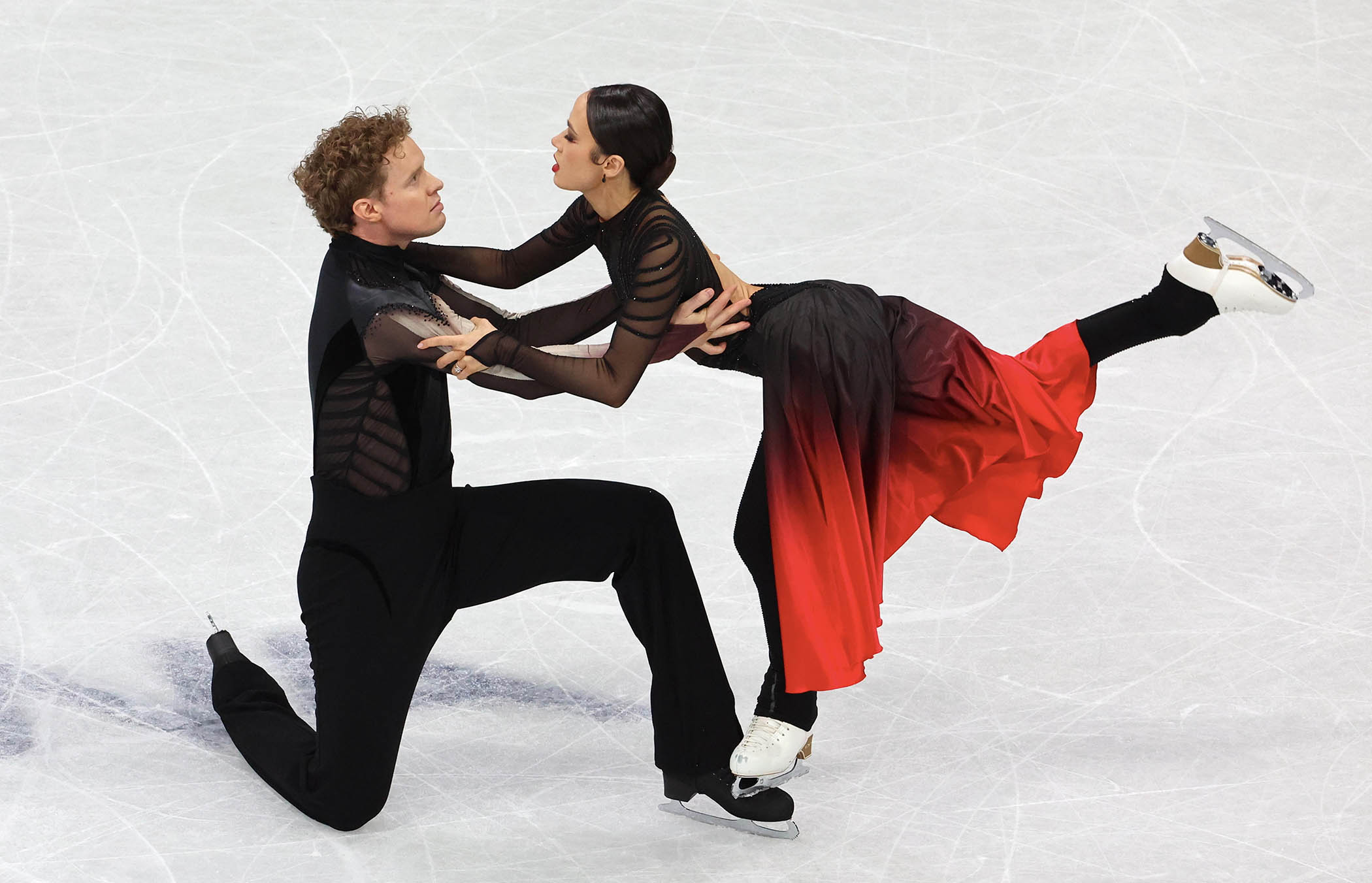Photographs by Oksana Parafeniuk for The Observer
Yehor Babenko, 26, was serving with the border force in Mykolaiv, southern Ukraine, when the explosion happened. It was just days after Russia had invaded and he remembers little about the moment itself: smoke, fire, chaos. He doesn’t know what weapons were used, only that he remained awake as his body burned.
Losing all of his fingers and with his face and body badly damaged, Babenko spent months in hospital, unable to speak because of smoke inhalation, before being sent to Spain for more than two years for medical assistance and physiotherapy. His injuries are hard to hide – his face is scarred and he lost his ears, most of his nose and now breathes through a tracheostomy tube.
“For veterans, life is divided into before and after the injury,” says Babenko, who is back in Ukraine now and working as a counsellor to help other recovering servicemen.
His next challenge is to find love. Step by step, he says, he is becoming more self-assured and although he believes he is too young to get married, he would like to date. “I can’t say I was very popular with women before the injury, though,” he jokes.
More than three years into Russia’s full-scale invasion of Ukraine, thousands of soldiers have suffered life-changing injuries, from lost limbs to visual impairments, burns and other trauma. More than 130,000 veterans are living with disabilities caused by the war and they are navigating not only physical rehabilitation, but also how to reclaim their intimate lives.
For the young men who make up much of Ukraine’s army, these injuries strike at the heart of how they imagine their futures: as partners, husbands, fathers.
“After catastrophic injury, veterans sometimes ask doctors whether they will ever have sex again before questioning their ability to walk,” says Kateryna Skorokhod, director of the Analytical Centre at Veterans Hub, who led a research project exploring sexual recovery in veterans.
Alexander Tolochenko, 24, was serving with an assault brigade near Lyman, in the eastern Donetsk region, when in May 2023 an explosion tore away one of his legs. The other was amputated later in hospital and he also suffered injuries to his abdomen. He was in a coma for eight days, but when he woke up the first thing he checked was his genitals. “I could live without hands, but I can't imagine my life without that,” he jokes.
At first, I thought no one would ever be interested in me, but things soon became comfortable and in some ways even more logistically convenient than before
At first, I thought no one would ever be interested in me, but things soon became comfortable and in some ways even more logistically convenient than before
Alexander Tolochenko, injured veteran
Double leg amputations are among the most devastating battlefield injuries, threatening both mobility and independence. It’s much harder to walk with prosthetics, and above-the-knee amputations like Tolochenko’s are even tougher still. Rehabilitation is a long and exhausting process and, to begin with, he thought, “life was over”. He needed help with daily tasks such as washing, cooking and going to the toilet, and found it humiliating.
Newsletters
Choose the newsletters you want to receive
View more
For information about how The Observer protects your data, read our Privacy Policy
For Tolochenko, who says he has always been popular with women, his sexual life was an important part of how he saw himself. Facing the overwhelming challenge of learning to manage basic tasks independently, his thoughts turned quickly to intimacy and his confidence in his own body. Initially shy and uncertain, he sought guidance from sex workers, an experience he says was like “losing his virginity again”. It helped him regain his sense of masculinity and sexual agency.
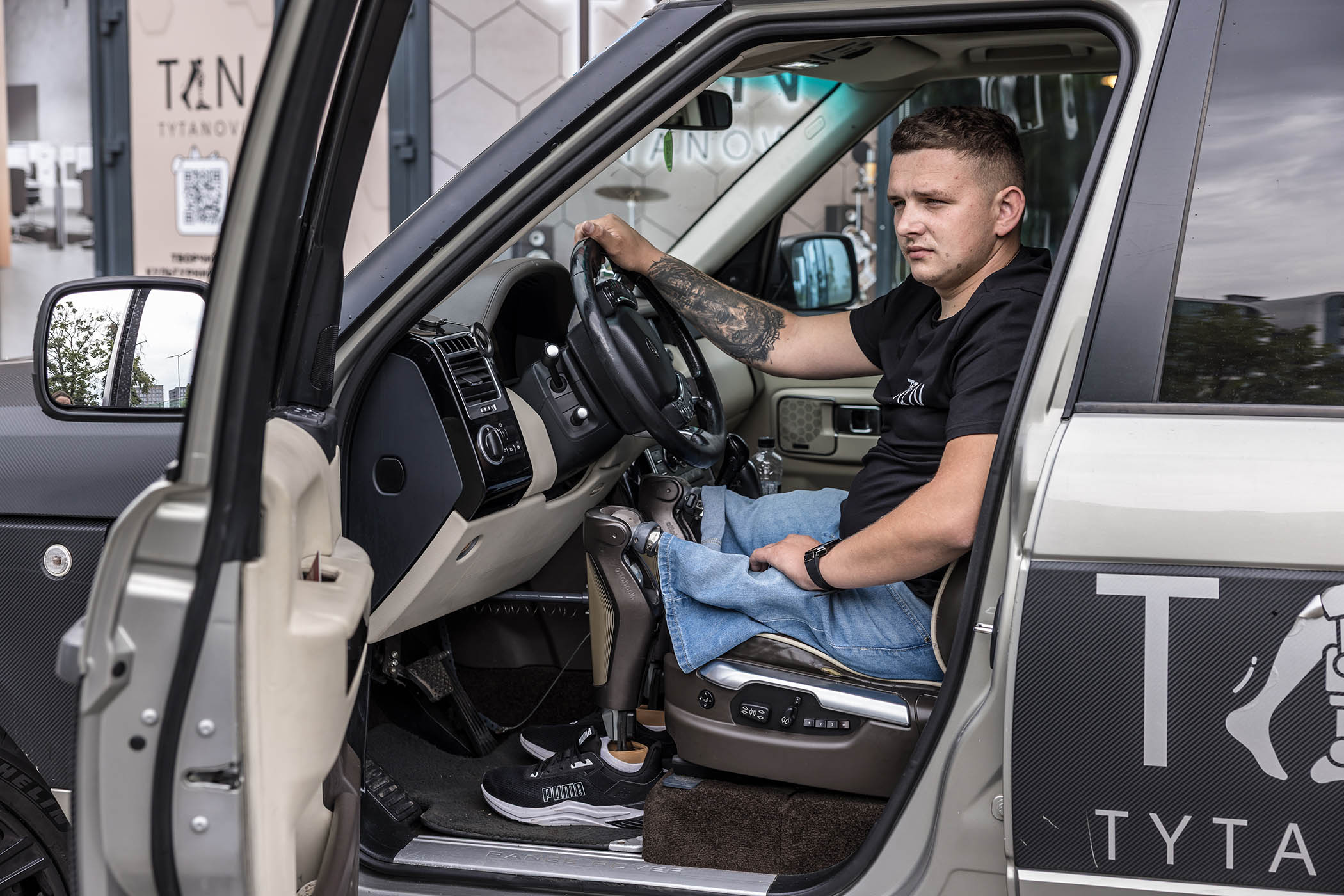
Alexander Tolochenko, 24, lost both legs above the knee in the fighting for Bakhmut in May 2023.
“At first, I thought no one would ever be interested in me, but things soon became comfortable and, you might be surprised, in some ways even more logistically convenient than before,” he says, with a wink.
We speak at a Kyiv rehab centre called Titanium, where he tries to be an ambassador to reassure and advise others because, he says, “it’s not like you lose your legs every day”. Late last year, he met a woman and they are now living together.
Sex and disability have long been taboo subjects in Ukraine due to lingering Soviet conservatism and the influence of religion. Disability was once hidden away and treated as something shameful, while sex was rarely spoken of openly beyond private circles. Now that silence is beginning to break.
“Society is becoming more educated and more understanding,” said private sex therapist Svyatoslava Fedorets. She runs education courses through social media, hoping to dispel myths and help people change their way of thinking.
Social media is helping change attitudes, with veterans who document their recovery journeys on sites such as Instagram often attracting large audiences. Oleksandr “Teren” Budko, who suffered double amputation after being injured in Kharkiv in 2022, is now a well-known disability rights campaigner. He has swum in the Invictus Games and starred as the lead in Ukraine’s version of the reality TV show The Bachelor last year – he told me at the time that he attracts more attention from women since his injury than he did before.
The shift is also reflected in public initiatives – sex shop chain N-Joy recently opened a sexual education space in Kyiv dedicated to the rehabilitation of veterans. The company says it aims to normalise talking about sexual recovery after trauma, and it stocks products tailored to help men and women with disabilities maintain intimacy and explore pleasure.
It doesn’t matter how many legs or hands a person has – you just need to adapt your approach. If you love someone, it doesn’t matter.
It doesn’t matter how many legs or hands a person has – you just need to adapt your approach. If you love someone, it doesn’t matter.
Yulia Mizina, wife of an injured veteran
If left unaddressed, however, sexual and intimacy challenges could affect personal relationships, family planning and the country’s broader social fabric, warns Skorokhod. Ukraine is facing a looming demographic crisis, with both the lowest birth rate and highest mortality rate in the world, according to the CIA. Last year, the number of divorces spiralled to almost as many as the number of marriages.
Common problems include erectile dysfunction, reduced libido and feelings of inadequacy. With hours sat in trenches, porn addiction is also an issue, and some develop sexual issues after getting aroused on the battlefield or having discovered an atrocity – a well-documented fear response. Some veterans report feeling numb or disconnected during intimacy, while others experience pain during sex due to scars or nerve damage. Psychological trauma compounds these issues: anxiety, depression and post-traumatic stress can reduce sexual desire or create performance anxiety.
Recovery can be most difficult for single men, as the presence of a supportive partner often makes recovery easier, yet treatment combining medical intervention, physical rehabilitation and psychological support is highly effective. In 2023, a project was launched to train psychologists to support veterans to rebuild their sexual and personal lives, and this year the first office was opened in Kyiv, where they offer free consultations with a sexologist.
Medications and devices can help restore sexual function, but open conversations, trust and gradual reintroduction of intimacy are key. So are changes of perception – spontaneous sex is often not possible if you’re disabled. “Of course, your life isn’t going to be the same, but your sex and intimacy can be great. It will probably be different, but just as interesting,” says Skorokhod.
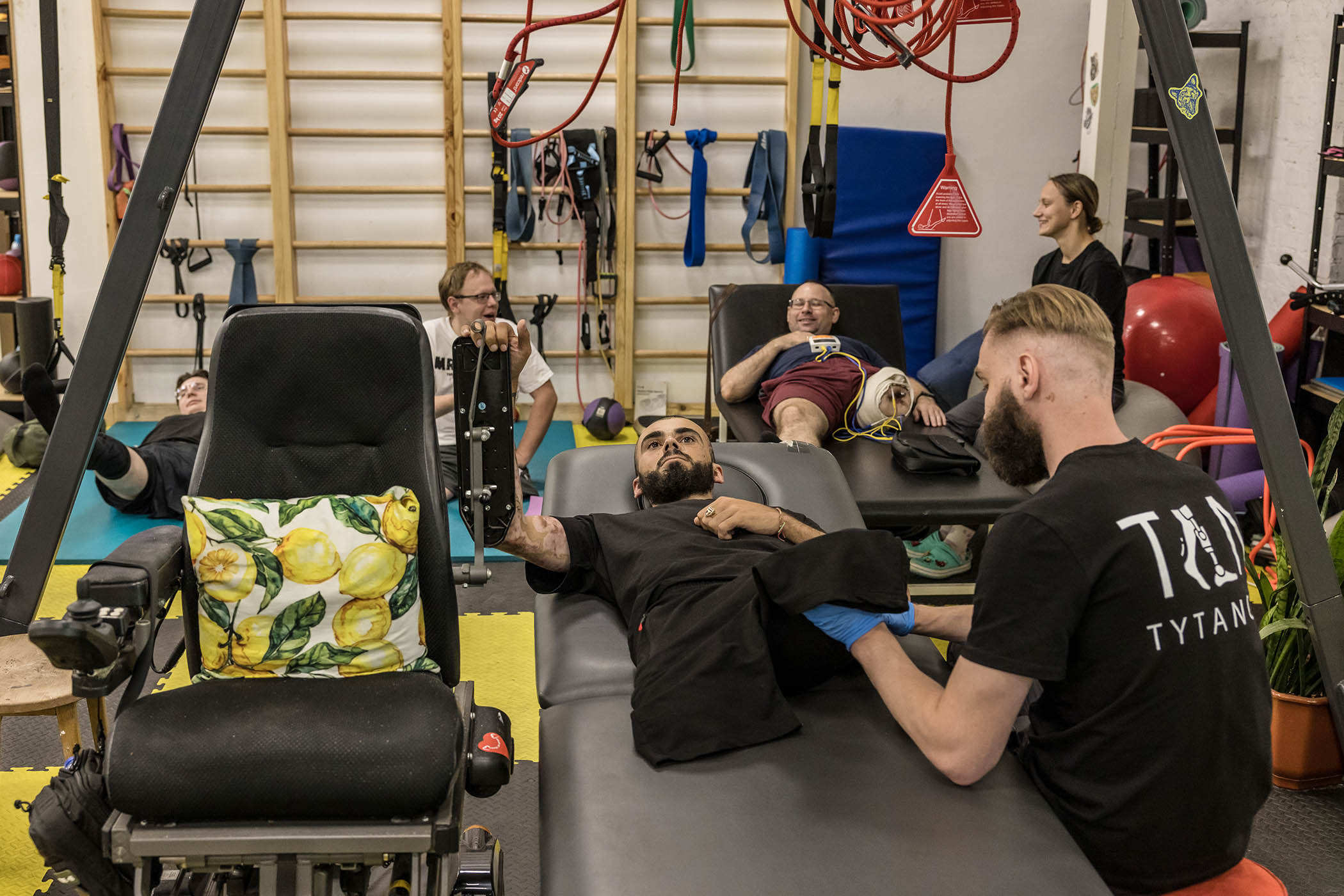
War veterans exercise at the Tytanovi rehabilitation centre for veterans in Kyiv.
Some veterans reported that their sex lives were actually better after the injury, she says, because they and their partners were forced to communicate more openly and experiment with new ways of being intimate. Even patients who have suffered severe injury to their genitals can learn how to be intimate in new ways. Skorokhod says it “stops being about orgasm and becomes about listening to yourself and finding new ways to connect”.
Yulia Mizina’s serviceman husband, Vitaly, was injured in a missile attack in May 2022, suffering severe burns and “effectively losing one side of his body”, she says. He lost his right arm, leg and side of his head, which had been burned to the skull. He survived burns to 60% of his body, but doctors warned her to prepare for the worst.
Now living in Finland, where Vitaly is still in rehabilitation, they have three sons – the youngest of whom was conceived during his recovery. At first, Mizina had to help him with basic tasks, and there were moments when she felt like his carer, but she refused to let intimacy slip from their marriage. She says his ordeal has made them closer.
“When he came home from hospital, it was painful to see his body and his soul in that condition. I cried. But even at that time, we found ways to be intimate,” she says. “It doesn’t matter how many legs or hands a person has – you just need to adapt your approach. If you love someone, it doesn’t matter.”
Babenko recently started talking to a woman he met on Instagram and is hoping that he will soon be able to take her on a date. He says he isn’t seeking a partner based on their looks, but wants to find a real connection with someone.
“Some veterans actually become more confident after injury because they saw that they can survive in the face of disaster,” he says. “I say this to any young men who have self-esteem issues – don’t give up! Sometimes, it can just take time to see how strong we are.”
